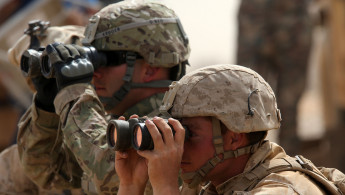Graduate 'knights of the future' recruited in Jordan
A new recruitment programme aimed at recuiting university graduates was this week confirmed by General Mashal al-Zaben, the chairman of Jordan's joint chiefs-of-staff.
Dubbed "The Knights of the Future", the initiative will provide a five-year "apprenticeship" to graduates who meet the requirements.
The move comes in response to King Abdullah's request that Jordan's army reconsiders its approach to the recruitment and career development of commissioned officers.
The king also insisted that the army should retain an "advanced level of professionalism, capabilities and abilities". The knights of the future project is one of many "integrated programmes within a comprehensive national strategy", officials said.
This recruitment drive represents an important development that stretches beyond Jordanian borders.
While the project is designed to create opportunities for young Jordanians, the notion of recruiting "qualified" graduates now holds a national and regional strategic significance.
It is understood that these military changes are King Abdullah's attempt to kill at least two birds with one stone.
On one hand, the new recruitment programme will help plug a shortage in troop numbers protecting the country's porous borders.
With only 10,000 soldiers, Jordan finds itself vulnerable to threats such as the Islamic State and the Assad regime. Not long ago, there was a number of reported clashes between Jordanian and Syrian forces on the northern border.
Furthermore, the IS group has previously threatened to invade Jordan.
Jordan has managed to remain safe and stable against the turmoil of geopolitical winds blowing in from its neighbours. Jordan's military has also helped "keep the peace" in some Arab countries. However, in light of increasing regional tension, it would be safe to assume that Jordan feels there is a need for the army to grow.
Another factor behind the Knights Of The Future initiative is the increasing unemployment rate.
According to a recent survey by Trading Economics, unemployment has increased to 12.9 percent in the first quarter of 2015 from 12.3 percent in the final quarter of 2014.
In January, unemployment was at its highest in two years.
The demand for new employment opportunities has subsequently increased significantly.
source: tradingeconomics.com |
| Chart showcasing unemployment rates in Jordan 2012-2015 |
King Abdullah has also reprtedly been pressured by tribal leaders to restore compulsory military service.
The system was suspended in 1994, though it was popular among the Bedouin tribes - often described as the backbone of the kingdom.
The Future Knights project is equally open to men and women below 25 years of age, and officials say enrollment will be completely based on "competency", rather than any nepotistic connections.
Jordan's army claims the project will provide the opportunity for graduates to join the military as officers for a five-year fixed term - defined as "phase one".
Successful candidates will receive a monthly wage of 150 Jordanian Dinars ($212), plus benefits, medical insurance for themselves and their families, transport, and national insurance payments.
The new recruit and their direct leadership will decide whether or not to stay for a further five years once "phase one" is complete.
Although they will have the same benefits as other officers recruited the traditional way, the Knights Of The Future programme offer neither permanent employment nor postgraduate scholarships that others enjoy.
Applications will open in February, and it will take eight months for the military committee to decide on the new recruits.
The issues in question, however, will be the impartiality of recruiting committees in establishing equal opportunities for all Jordanians alike - within a strong tribal current - and whether the new recruits will be part of some as-yet-unannounced wider strategic military goal for Jordan's army.



